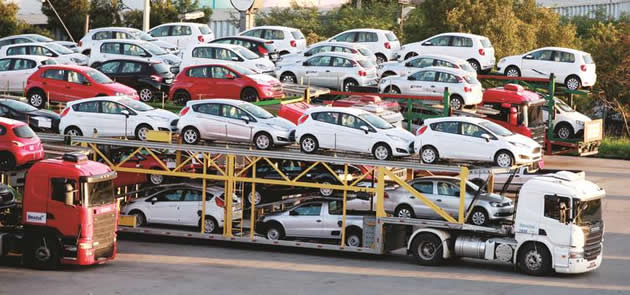There’s no liquidity crunch!

YES there is no liquidity crunch but misplaced priorities, rather misplaced purchases. Zimbabwe is not experiencing any liquidity crunch. Please don’t shoot us before we explain where we are coming from.
Just look at imports and tell us why they don’t experience the same liquidity crunch as the local goods.
Check the bill on mineral water, high engine capacity vehicles, maize, hair products, apples, potatoes, second hand clothes, toothpicks, napkins, poultry products, ex-Japanese vehicles and tell MoB there is a liquidity crunch.
If there was, then these should be experiencing a crunch like no other but sadly import figures continue on the upward trend and breaking records in a non performing economy.
How do we explain the import bill in diapers, soft drinks and meat products because these are manufactured locally?
Zimbabwe spent $1.6 billion in January, February and March 2015.
In three months we blew $1.6 billion Obamas and that is only recorded statistics.
We all know how much of our statistics are not captured. By year end one shudders to think how much we would have spent on imports.
The crunch is mostly on local products. Check even the education import bill, be it fees, e-learning, learning gadgets etc etc. Why don’t these experience liquidity crunch?
How come education fees outside are paid on time than for local institutions.
Learning materials for outside learners are purchased with a sense of urgency than local students.
All these imports are creating jobs and industries where ever we are sourcing these goods and services.
Look at your money. Where you are using it, it’s where jobs will be created and that is where liquidity will be.
Liquidity is a matter of coordinates so you can’t convince me Zimbabwe suffers from lack. No!
We are not into our own things. Money is available, it’s just being spent on wrong things and those wrong things don’t reside within our borders.
If money wasn’t there then, we wouldn’t even be buying all these imports.
I know we have other goods purchased by the Zimbabwean Diaspora.
We are well aware of those but we are talking of simple purchases done by Zimbabweans in Zimbabwe.
It’s as simple as that. We import fully made T-shirts and not raw materials. We even subscribe TV programmes in other countries.
We buy used tyres, we buy foreign-bred dogs, we buy lightening creams etc.
We even fly on foreign owned planes. We are smoking all those imported cigarettes that left Zimbabwe as a primary tobacco leaf bought at slavery prices because we don’t add value.
We understand it’s about pricing but we are trying to show that it is not really about liquidity per-se.
How many consultants have we brought from outside and at times it’s our own sons and daughters that have relocated to give us solutions.
India is leading in most of the surgical operations performed on Zimbabweans when we have our own equally good facilities if it wasn’t for pricing.
We are buying in cash for our imports but paying on credit to local producers.
This is exporting jobs at unparalleled levels. Capital goods imports we can understand but luxuries that are still available in Zimbabwe it boggles the mind as to what is really going on.
One wonders that this liquidity crunch about imports is all about, isn’t there a psychological thing to it because it’s becoming difficult to interpret some behavioural inclinations by the customers.
It’s becoming hard to understand how it’s happening.
Why can’t we partner the Chinese, Indians and South Africans to come and invest in Zimbabwe and all these ventures are done within the country?
That way we share in the profits being made. It’s 50/50 and we don’t bleed the treasury that much.
These are smart joint ventures while we try to get our economic footing right.
We need aggressive Buy Zimbabwe Campaigns to try to counter but we need actionable concrete plans.
“Liquidity” crunch solving will require sacrifice from individuals, organisations and the government.
This is every individual’s responsibility.
If individuals are irresponsible then how do you expect organisations or the government to be responsible when these are made from individual citizenry.
Culture has to change as individuals market organisations and market governments.
There is a need to pull in one direction and endure the short term pain so that in the end we can all be winners.
We encourage Zimbabweans in the Diaspora to send cash instead of goods to increase FDIs in the hope that those at home will purchase local products.
The funny part is that even these foreign remittances are still used to purchase imported products within our local shops.
Our unquenchable desire for foreign services and products will leave us all mortgaged to foreign influence and ownership.
Production competence and efficiency is the way to go to address the perceived liquidity crunch.
We need to produce at competitive costs. We are not saying NO to imported products/services but we are saying level the playing field so that there is fair competition between local and imported products.
There is no need to protect local industry inefficiencies through protectionism.
These inefficient producers don’t need to be protected as they are equally abusive to the customers as the importers who come in at an uneven field to the local producer.
One thing though packaging and re-packaging isn’t production at all from which ever angle you look at it and has to be discouraged and levied taxes that bring in fairness.
Can we be productive? Yes we can.
Can we be efficient? Yes we can.
Can we optimise our factors of production? Yes we can.
Can we increase our capacity? Yes we can.
Can we be competitive? Yes we can.
Are we ready for this? Maybe not.
As the Bible says we shall see them by their deeds.
We all know what is required by all stakeholders as the song of what we require to do has been played over and over and over again.
No need to repeat what everyone knows is expected of them. Yes we all know what’s required of us stakeholders. If we don’t then we have serious problems at hand, which could be beyond redemption.
We just need commitment from all stakeholders and stop moving lackadaisically towards resolving the so called liquidity crunch.








Comments